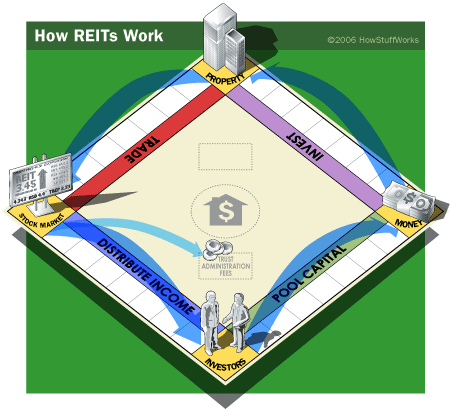REITs An Easier Way to Invest in Real Estate
Post on: 9 Июнь, 2015 No Comment

REITs: An Easier Way to Invest in Real Estate
In contrast to gold and silver, investing in real estate gives you a tangible asset that generates income rents or, in the case of agricultural property, crops, which can be sold for income. The beauty of an income-producing asset is that it unlocks part of your investment every year. You’re then free to spend your income if you wish, or to reinvest it any way you like. With non-income-producing investments, you’re locked in for the duration, for better or worse.
What’s more, because the income produced by investing in real estate tends to rise with inflation, the value of the underlying property also rises over time. Among all the tangibles, investing in real estate comes closest to letting you have your cake and eat it, too.
Direct vs. Indirect Ownership
Through the years, I’ve known many investors who have enjoyed excellent returns on real estate they personally owned and managed. If you’re a hands-on individual, direct investing in property is still a great a way to build (or increase) a fortune.
However, most of us lack the time, energy or skills to be landlords. For us, it makes more sense to invest indirectly in property through real estate investment trusts (REITs).
By pooling the resources of many investors, REITs can hire top-notch professional management and acquire large, diversified portfolios of property. Thanks to their special legal status, REITs also save on taxes. A REIT is required to pass along the vast bulk of its taxable income to you, the shareholder, in the form of dividends. In so doing, the REIT basically eliminates corporate income tax.
Even though REITs are, at bottom, real estate, share prices for publicly traded REITs (those listed on the NYSE or other stock exchanges) often feel the tug of broader equity market trends. From March 2009 until last spring, REITs rode the crest of Wall Street’s bull market. The average property-owning REIT more than tripled over that span.
Since May 2013, however, REITs have undergone a severe correction. As we speak, the MSCI U.S. REIT Index stands 18% below its 52-week high.
In essence, REITs have followed the bond market down. At some point soon, though, I believe investors will wake up and realize that REITs aren’t bonds. If the economy is truly improving, as the optimists insist, landlords will be able to raise rents, perhaps at a faster pace than before. REITs’ cash flow will increase, ultimately making the shares more valuable.

A Timely Pick
For instant exposure to the whole gamut of REITs, there’s no better vehicle than Vanguard REIT Index ETF (VNQ ). As the name implies, the Vanguard fund is designed to mimic the MSCI U.S. REIT Indexand VNQ does a nearly perfect job of it. Over the past three years (through December 31, 2013), the fund’s return at net asset value has trailed the index by only 0.07% annually. That’s a resounding tribute to Vanguard’s frugal and effective management.
With 126 stocks in its portfolio, VNQ offers you ample diversification. Current yield, based on the past four quarterly distributions: 4%. Note that most of your dividend will be taxed as ordinary income. Accordingly, I suggest tucking VNQ into your tax-sheltered retirement account if you can.
Yours for Profitable Investing ,














